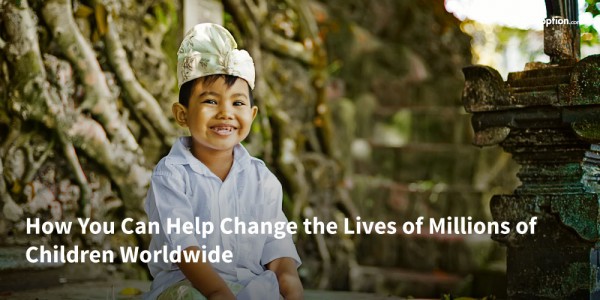Millions of children worldwide live in orphanages.
This is not just sad. It is not just a problem. It is a worldwide tragedy.
Decades of research indicates that children living in institutional care will suffer from social, emotional, and behavioral abnormalities as a result of the time they spend living outside a family.
However, research also indicates that these effects can be mitigated by placement in family care at as early an age as possible.
This leaves no doubt: Children don’t just need shelter and food and education; they need families. Unfortunately, most of the seven million children living in orphanages don’t make it into families. These children–our world’s future–spend crucial developmental years without the support, love, and stability that a family provides.
Which begs the question: Why are so many children living in institutions instead of homes?
That’s the very question that retired entrepreneur Craig Juntunen asked in 2006 when he traveled to Haiti and became aware of the plight of orphans worldwide. He wondered if there were so many children living in orphanages because there were no families willing to adopt them. He quickly learned this was not true.
So what was the problem? Juntunen actually hired a consulting firm to look into this question. The research helped him identify the underlying issues, and he then founded the non-profit organization Both Ends Burning, an organization aimed specifically at creating awareness about these problems–and then working to solve them.
“We’re all upset by this problem,” Craig says. “But people haven’t taken the lead yet to produce effective solutions. We have to stop writing papers about it and articles about it and arguing about it—what we need to do is create effective solutions to serve these kids.”
Both Ends Burning’s Effective Solutions
Both Ends Burning produced a penetrating, award-winning documentary, Stuck, a film about children unnecessarily trapped in sub-par institutional care and parents in the U.S. fighting to bring them home. They’re currently working on reforming legislation in the US. They organized a march in Washington. They’ve been on television shows. They’ve published articles.
But more than talking about the problem, they’re actively changing the root causes of the problem. In November 2014, Both Ends Burning invited representatives from countries around the world to attend a symposium focused on improving child welfare worldwide.
Juntunen was surprised to learn that most of the world’s child welfare leaders were not familiar with the research demonstrating the negative impact long-term institutionalization can have on children. “People were shocked to learn the science,” says Juntunen. “They’d never seen it before. And I said, ‘So here we’ve got the heads of child welfare from 18 different countries and most of them are unaware of the scientific evidence that institutionalization damages kids. What we learned is that the world thought putting kids in orphanages was a good thing. Now we understand WHY we’re behaving the way we’re behaving.”
This symposium opened up the doors for Both Ends Burning to build working relationships with each of these countries. Now Both Ends Burning is making visits to each country, working with governments to help implement the changes they identified at the symposium.
Juntunen explained, “Our basic model now is to go to countries, visit them, do a needs assessment, establish some prototype or pilot programs, take those programs back to the group in the next symposium (which, in this case, will be April of next year in California), and share those experiences.” That way the countries can build on each others’ successes.
“If we succeed in repeating the cycle of global gatherings, country visits, creating programs, and then reviewing these innovative programs at future symposiums, we believe over time, permanent family care outcomes will replace the current go-to strategy of institutionalizing children.”
He continued, “Child welfare is currently basically based around survival. So we vaccinate the kids, we feed them, and we shove them in warehouses. And that’s been the basic model of global child welfare. We can’t discount protection–we don’t want these kids trafficked or harmed–but why can’t we include family in that matrix of approach? We’re going to protect, we’re going to keep them alive, and we’re going to get them into a family. That’s basically our mission. Our purpose is to create family care and promote a new era of child welfare where people are saying, ‘Okay, we’re going to go to the next level and we’re going to really start looking at ways to get these kids into families, whether it’s their family of origin, or a family in the community, let’s promote family. If we do that over 10, 20, 30, 40 years, the world’s a better place. Because kids need a family. We all should understand that.”
You Can Help
Both Ends Burning believes they will change the lives of many children if they can obtain the resources of time, people, and money. We can all help their entrepreneurial efforts by becoming a Global Child Protector. For $5 per month each of us can make a small contribution that will make a big impact.
We also recommend watching the documentary STUCK and sharing it with your friends. This film is available on Netflix.

